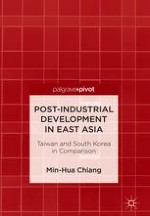2018 | OriginalPaper | Buchkapitel
2. Sustaining Taiwan’s and South Korea’s Post-Industrial Economic Growth: The China Factor
verfasst von : Min-Hua Chiang
Erschienen in: Post-Industrial Development in East Asia
Verlag: Springer Singapore
Aktivieren Sie unsere intelligente Suche, um passende Fachinhalte oder Patente zu finden.
Wählen Sie Textabschnitte aus um mit Künstlicher Intelligenz passenden Patente zu finden. powered by
Markieren Sie Textabschnitte, um KI-gestützt weitere passende Inhalte zu finden. powered by
